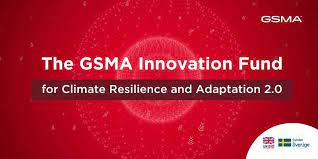The problem of climate change has triggered a grave crisis on a worldwide scale, which has led to the collapse of entire nations and the uprooting of untold numbers of people. As a means towards achieving this goal, the GSMA Innovation Fund for Climate Resilience and Adaptation is currently operating in its second phase.
The fund provides financial assistance to newly established businesses in the fields of technology and social entrepreneurship in the regions of Africa, Asia, Europe, Latin America, the Caribbean, and the Pacific Islands. This programme aims to create strategies that make use of digital technology, particularly mobile technology, in order to improve the capacity of communities to adapt to the effects of climate change and to withstand its impacts.
The selected organisations will get a comprehensive support package, which will include financial assistance in the form of grants. The grant award ranges from 100,000 to 250,000 British Pounds, which is around $125,000 to $200,000.
The organizations that were chosen will be provided with individualized technical assistance, possibilities for peer learning, and assistance in developing links with mobile operators and public sector organizations.
In addition to this, the programme promises to increase the exposure of entrepreneurs in the eyes of potential business partners and investors by highlighting them in the events, publications, and social media. This is a follow-up to the first edition, which was held successfully the year before and resulted in eight African start-up companies receiving investment.
GSMA Innovation is a product of a collaborative effort between two well-known worldwide organisations. The Foreign, Commonwealth, and Development Office of the United Kingdom (FCDO) and the Swedish International Development Cooperation Agency (Sida).
Through the testing and implementation of innovative digital technologies at smaller scales, the programme also aims to have a positive effect on the socioeconomic and environmental environments. Especially in areas where the inhabitants are the most vulnerable to the effects of the climate as it now or as it may become in the future.
Read also: Investing in Innovation Africa (i3) calls for applications from innovators
About GSMA
The non-profit GSM Association (GSMA) represents mobile network carriers globally. It has around 750 full members and 400 associate members in the mobile ecosystem. Industry programming, working groups, and advocacy represent GSMA members.
History
The original GSM MoU: “A Pan-European 900MHz Digital Cellular Mobile Telecommunications Service” (7 September 1987).
The GSMA was founded in 1995 as the ‘GSM MoU Association’ to support and promote mobile operators adopting the GSM (Global System for Mobile communications) standard for cellular networks. 13 operators from 12 countries signed a memorandum of understanding in 1987 to adopt GSM for mobile services.
Governance and membership
GSM-licensed mobile operators can join the GSMA. Its membership includes 750 such operators worldwide. Non-operator mobile ecosystem enterprises can become GSMA associate members. These include handset, device, software, equipment, Internet, and financial services, healthcare, media, transport, and utility corporations. This category has 400 GSMA members.
The biannually elected GSMA board contains 25 representatives from the world’s top operator groups and chosen smaller operators. In January 2022, Telefónica CEO José María Álvarez-Pallete López became GSMA Chairman. Mats Granryd became GSMA Director General in January 2016.
Programmes and advocacy
The GSMA manages industry activities with its members to scale and interoperate emerging mobile technologies. ‘Future Networks’, ‘Identity’, and ‘Internet of Things’ are its three active programmes.
It runs industry working groups on roaming and connectivity, fraud and security, and intellectual property, as well as other specialty committees and organisations.
The GSMA promotes mobile industry policy and regulation to governments and institutions. Its declared goals in this field are to guarantee that mobile telecoms “policy and regulatory frameworks are fair, flexible and future-proof”; that radio spectrum is made available for mobile services “in a timely and fair manner”; and to promote mobile services in emerging markets.GSMA’s Industry Purpose programme supports UN Sustainable Development Goals.
Events
In 2019, over 109,000 people attended the GSMA’s Mobile World Congress Barcelona (MWC Barcelona), the mobile industry’s biggest annual event. It began in 1987.
Since 2006, Barcelona has hosted the event in Fira Gran Via and Fira Montjuïc. The event set a fourth Guinness World Record for the largest carbon-neutral exhibition in 2019.
The GSMA organises MWC Barcelona, MWC Shanghai, MWC Las Vegas, and the ‘Mobile 360’ series of regional events.




